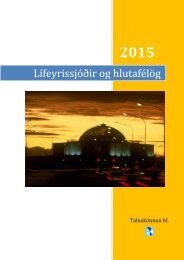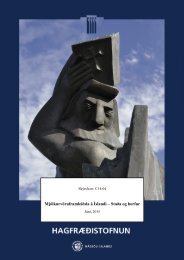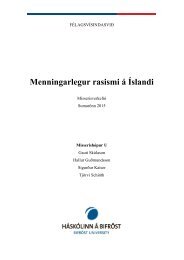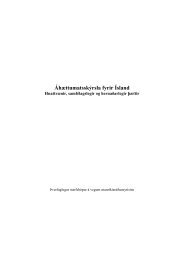You also want an ePaper? Increase the reach of your titles
YUMPU automatically turns print PDFs into web optimized ePapers that Google loves.
WORLD REPORT 2016<br />
HUMAN RIGHTS WATCH<br />
actors for their views on the conflict. In September, the government expanded<br />
the list of persons banned from entering Ukraine to 382. Among them were 35<br />
journalists and bloggers from several countries, including Russia, Israel, and<br />
Great Britain.<br />
In June, a package of laws entered into force that ban Nazi and communist symbols<br />
and criminalize denial of the “criminal nature of the communist totalitarian<br />
regime,” punishable by up to five years in prison. “Propaganda” of either ideology<br />
is punishable by up to 10 years in jail. Another law recognizes as “fighters for<br />
independence” nationalist groups that fought Germany during World War II but<br />
also collaborated with the Nazis. The law also criminalizes questioning the legitimacy<br />
of their actions.<br />
The armed conflict and the political tension caused by the information war between<br />
Russia and Ukraine have jeopardized journalists’ safety. A prominent pro-<br />
Russian journalist was shot and killed in Kiev in April. At time of writing, the trial<br />
of two men charged with the murder was ongoing. Nearly all pro-Ukrainian journalists<br />
fled eastern Ukraine and Crimea and relocated to government-controlled<br />
parts of Ukraine, fearing repercussions from local authorities. Rebel authorities<br />
in eastern Ukraine deny accreditation to foreign correspondents whose reporting<br />
is “unfavorable.” In June, rebel authorities in Donetsk region expelled a journalist<br />
from the independent Russian newspaper Novaya Gazeta, and rebel forces<br />
beat him in retribution for his reporting.<br />
Sexual Orientation and Gender Identity<br />
The authorities have been more supportive of the lesbian, gay, bisexual, and<br />
transgender (LGBT) movement than in previous years, but homophobia and intolerance<br />
remain widespread.<br />
In June, the March for Equality took place in Kiev, and although the city’s authorities<br />
expressed concerns that they would not be able to provide protection to the<br />
participants, President Petro Poroshenko publicly supported the idea of the<br />
march. On the day of the march, several dozen far-right activists attacked around<br />
300 participants of the gathering, shouting abuses and throwing flares at them.<br />
Police tried to block the attackers, but nine policemen were injured in the<br />
clashes and one was seriously injured.<br />
In November, the parliament passed an amendment to the labor code that bans<br />
discrimination based on sexual orientation and gender identity, a precondition<br />
for instituting a visa-free regime with the European Union. LGBT activists voiced<br />
concerns that a newer version of the amended labor code being developed at<br />
time of writing did not include the same anti-discrimination provision.<br />
In June, a Kiev court overturned the government’s rejection of a transgender<br />
man’s application to have his gender fully recognized, ruling that the applicant<br />
did not have to prove he had been sterilized to receive documents in his preferred<br />
gender. The ruling represented a major victory in the struggle against the<br />
existing gender change process in Ukraine, which is lengthy and humiliating and<br />
violates rights of transgender people, including the right to health and the prohibition<br />
on inhuman and degrading treatment or punishment.<br />
Crimea<br />
The human rights climate in Crimea under Russian occupation remains repressive.<br />
People who decline Russian citizenship and retain their Ukrainian citizenship<br />
experience serious difficulties in accessing education, employment<br />
opportunities, or social benefits. The authorities did not conduct meaningful investigations<br />
into the 2014 enforced disappearances of Crimean Tatar and pro-<br />
Ukrainian activists.<br />
They continue to silence critical voices and pressure Crimean Tatars, the ethnic<br />
minority which openly criticizes Russia’s actions in Crimea. In April, ATR-TV, a<br />
Crimean Tatar television channel known for its critical reporting that lead to Russia’s<br />
occupation, was forced to cease operating because it was not able to reregister<br />
under Russian law within the deadline set by authorities. Meydan radio<br />
station and Lale, a children’s television channel, which are part of the same<br />
media holding company as ATR-TV, also had to discontinue. In May, Crimean authorities<br />
once again refused to allow public events in Simferopol to commemorate<br />
the 1944 deportation of Crimean Tatars.<br />
From September until time of writing, Crimean Tatar activists, backed by Ministry<br />
of Interior troops, border guards and the far-right group Right Sector, blocked<br />
roads connecting Crimea to mainland Ukraine to prevent food deliveries from<br />
Ukraine to Crimea to protest Russia’s occupation of Crimea.<br />
600<br />
601










